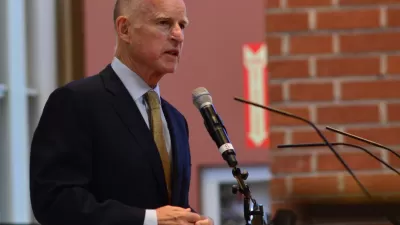The California legislature ended its season on Friday, handing Gov. Jerry Brown a third major victory. After passing landmark legislation earlier in transportation and climate change, a slate of controversial housing bills await his signature.

By all accounts, 2017 go down in history as a remarkably productive legislative year for California. A landmark transportation funding bill was passed, as well as bill to ensure that the nation's only cap-and-trade program continues beyond 2020. As of this past Friday, add to that a bevy of bills to create desperately-needed affordable housing in the nation's poorest state when living costs are considered.
"I think this has been an historic year for all of our accomplishments," said Senate President Pro Tem Kevin de León (D-Los Angeles) just after 2 a.m. Saturday. "We put our values into action." [Los Angeles Times]
A total of 15 housing bills were approved on the final day of the legislative season, reports Katy Murphy, who covers state government from Sacramento for The Mercury News. Three of the most important bills were advanced as a package, posted here last month. However, some bills were amended since then.
- Senate Bill 2 by Toni Atkins (D-San Diego). "It would create a new fee of [$75] to $225 on certain real estate transactions, such as mortgage refinancing, to fund affordable-housing projects," reports Murphy. "Home sales and commercial real-estate sales are exempt from the bill."
It would collect an estimated $200-$300 million per year in real-estate document fees. The state estimates the bill would generate more than $5 billion over the next five years once the new fees are matched with federal, local and private matching funds. And unlike in past years, the powerful California Association of Realtors supports the bill.
- Senate Bill 3 by Jim Beall (D-San Jose): "[P]laces a bond measure on the November 2018 statewide ballot with $3 billion set aside to also finance low-income development, and an additional $1 billion for veterans home loans," writes Murphy.
Both bills, because they raise taxes or fees, were subject to the onerous two-thirds supermajority requirement, meaning they needed 27 votes in the Senate and 54 votes in the Assembly. The real estate transaction fee bill turned into a "nail biter" on Friday night, the final day of the legislative season, passing with the bare minimum of votes in each chamber.
With one Democrat, Sabrina Cervantes of Riverside, opposing the bill (she called the bill "a regressive tax that disproportionately affects the middle class,") a Republican vote was needed, reports Liam Dillon for the Los Angeles Times.
The lawmaker, Brian Maienschein of San Diego, said his decision was motivated by an outbreak of hepatitis A in his city, which has killed 16 homeless residents in recent months. Maienschein, who worked on homelessness issues at the United Way in San Diego prior to his election, said he didn't like forcing homeowners to pay more, but the problem had reached emergency levels.
'This is a public health crisis,' Maienschein said. 'Our economy is at risk. And everyone in San Diego's quality of life is affected by this.'
The third bill of the package, Senate Bill 35 by Scott Wiener (D-San Francisco), which would force cities that have fallen behind on state goals for residential construction to ease development regulations, needed only a majority vote to pass. It has gained national attention as it tackles what many consider the most formidable challenge to housing in the Golden State: the unwillingness of council members in coastal cities, where the housing crisis is most severe, to approve new housing construction, tall and dense developments in particular.
"SB 35 would require cities and counties to limit environmental, planning and other reviews on land already zoned for a developer's proposed amount of housing," referred to as 'streamlining', adds Dillon.
Referring to the three-bill package, Gov. Jerry Brown, Assembly Speaker Anthony Rendon, and Senate President Pro Tem Kevin de León stated in July, "This comprehensive approach does what's long been needed in California — build new homes and improve access to housing."
Other housing bills covered by Planetizen
SB 167: Housing Accountability Act, aka anti-NIMBY law, and SB 166: 'No Net Loss Zoning' bill, both authored by Sen. Nancy Skinner, D-Oakland, (both posted here) were approved.
AB 1505 by Assemblymember Richard Bloom (D-Santa Monica) which will restore the right to require inclusionary zoning in rental units was approved.
AB 199 by by Assemblyman Kansen Chu (D-Milpitas) would require previously exempt development to be subject to 'prevailing wage' requirements.
Sanctuary bill
Perhaps the highest profile bill, though, was the "sanctuary state" measure, SB 54, which was hotly debated but passed rather comfortably. Gov. Brown is expected to sign it after amendments he requested are added.
For the bills that passed, Gov. Brown has until Oct. 15 to sign, veto, or allow bills to become law without his signature.
FULL STORY: California Legislature passes affordable housing bills

Alabama: Trump Terminates Settlements for Black Communities Harmed By Raw Sewage
Trump deemed the landmark civil rights agreement “illegal DEI and environmental justice policy.”

Planetizen Federal Action Tracker
A weekly monitor of how Trump’s orders and actions are impacting planners and planning in America.

The 120 Year Old Tiny Home Villages That Sheltered San Francisco’s Earthquake Refugees
More than a century ago, San Francisco mobilized to house thousands of residents displaced by the 1906 earthquake. Could their strategy offer a model for the present?

In Both Crashes and Crime, Public Transportation is Far Safer than Driving
Contrary to popular assumptions, public transportation has far lower crash and crime rates than automobile travel. For safer communities, improve and encourage transit travel.

Report: Zoning Reforms Should Complement Nashville’s Ambitious Transit Plan
Without reform, restrictive zoning codes will limit the impact of the city’s planned transit expansion and could exclude some of the residents who depend on transit the most.

Judge Orders Release of Frozen IRA, IIJA Funding
The decision is a victory for environmental groups who charged that freezing funds for critical infrastructure and disaster response programs caused “real and irreparable harm” to communities.
Urban Design for Planners 1: Software Tools
This six-course series explores essential urban design concepts using open source software and equips planners with the tools they need to participate fully in the urban design process.
Planning for Universal Design
Learn the tools for implementing Universal Design in planning regulations.
Clanton & Associates, Inc.
Jessamine County Fiscal Court
Institute for Housing and Urban Development Studies (IHS)
City of Grandview
Harvard GSD Executive Education
Toledo-Lucas County Plan Commissions
Salt Lake City
NYU Wagner Graduate School of Public Service





























